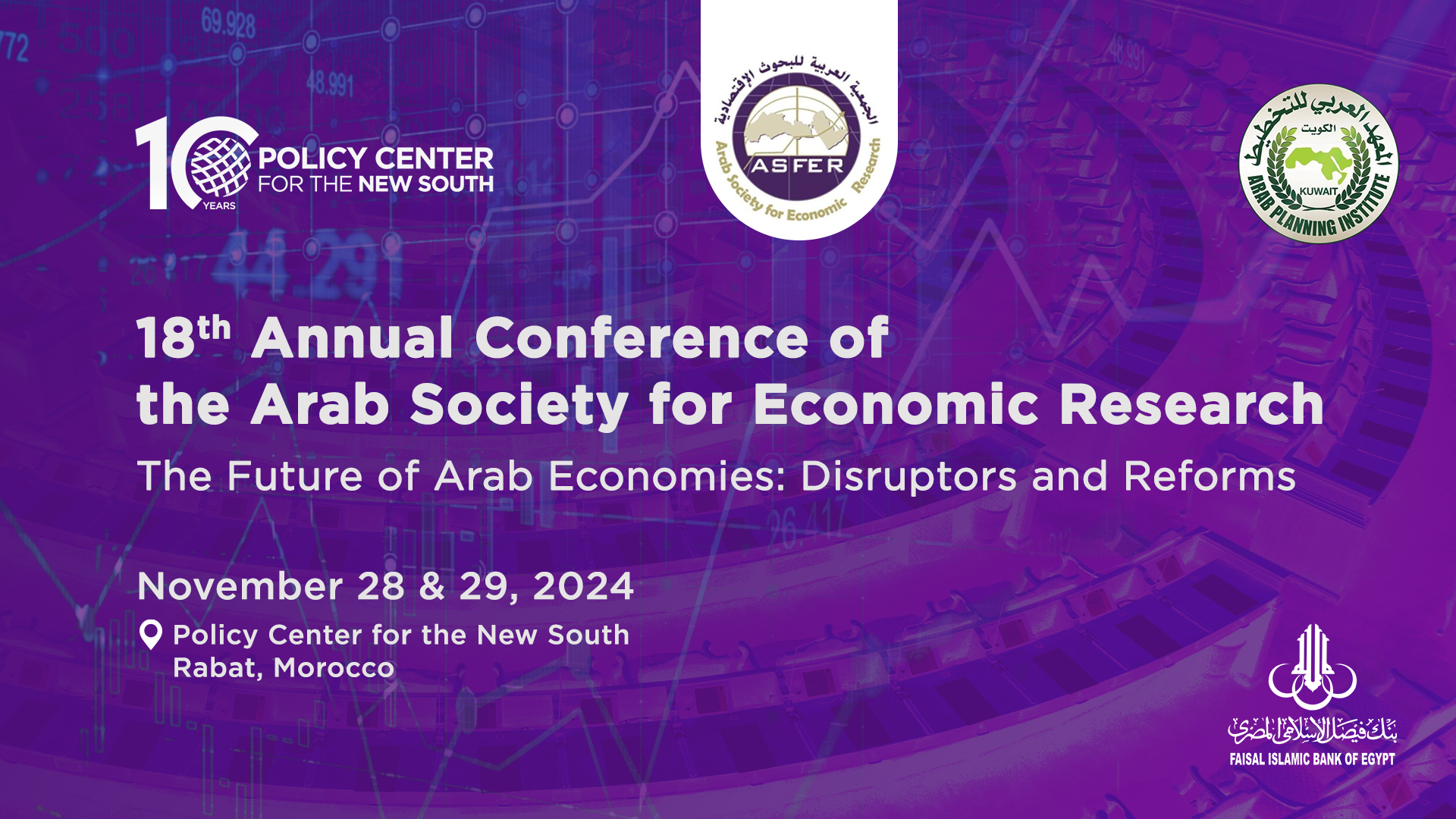Events
The 18th Annual Conference of the Arab Society for Economic Research
From
To

Sur Invitation
The Arab Society for Economic Research (ASFER), in collaboration with the Policy Center for the New South (PCNS), is organizing its 18th Annual Scientific Conference under the theme: “The Future of Arab Economies: Imposed Disruptions and Desired Reforms” on November 28-29, 2024 at the PCNS headquarters, Rabat. The conference aims to provide a comprehensive analysis of the local and international disruptions impacting the pursuit of sustainable development goals within Arab countries and to identify the essential reforms required to address these challenges. The discussions will be structured around four principal thematic axes:
• First axis: The evolution and volatility of the international economic landscape and its implications for inclusive economic growth in Arab countries.
• Second axis: Projections on the impact of the emergence of a new global financial system, considering the disruptions posed by current and prospective economic blocs, on the economies of Arab nations.
• Third axis: The role of technological advancements in fostering inclusive economic growth in Arab countries.
• Fourth axis: Policy frameworks for prioritizing and strengthening the resilience of Arab economies to external shocks and ensuring rapid recovery: the desired reforms.
EN
AR
Agenda
|
Day 1 – Thursday, November 28, 2024 |
|
|
09h00 – 09h30 |
Welcome coffee and registration |
|
09h30 – 09h50 |
Opening Remarks
|
|
09h50 – 10h30 |
Keynote address
|
|
10h30 – 11h00 |
Session 1 – The Launch of the 8th Arab Development Report Chair: Abdullah Fahad Al-Shami, Director General, Arab Planning Institute
|
|
11h00 – 11h30 |
Presentation and key messages of the 8th Arab Development Report (ADR) on “The role of data and its availability in supporting development in Arab countries” Belkacem El-Abbas, Editor-in-Chief |
|
11h30 – 12h00 |
Discussion |
|
12h00 – 13h00 |
Lunch |
|
13h00 – 14h30 |
Session 2 – The Impact of Conflicts and Disruptions on Development in the Arab World and Resilience Mechanisms Chair: AbdulHamid El-Zigalaie, Board Member, ASFER
Paper presentation 1 - The Economic Impacts of Armed Conflicts in the Arab World 2011-2024
Paper presentation 2 - Disruptions and the Path to Resilience in Egypt
Paper presentation 3 - The Arab World Between Disruptions and Policy Challenges
|
|
14h30 – 15h00 |
Discussion |
|
15h00 – 15h30 |
Coffee break |
|
15h30 – 17h00 |
Session 3 – Economic diversification and determinants: human development, finance and energy transformation Chair: Khaled Hanafi, Secretary General of the Union of Arab Chambers and Board Member, ASFER
Paper presentation 4 - Financial Development and Economic Diversification in GCC Countries Evidence from Linear and Nonlinear Models
Paper presentation 5 - Energy Transition's Impact on Populations: An Empirical Study on Arab Children’s Lives
Paper presentation 6 - Human Capital and Economic Diversification Under Uncertainty in Arab Oil Exports Countries
|
|
17h00 – 17h30 |
Discussion |
|
Day 2 – Friday, November 29, 2024 |
|
|
08h45 – 09h15 |
Welcome coffee |
|
09h15 – 09h30 |
Keynote address Younes Sekkouri, Minister of Economic Inclusion, Small Business, Employment and Skills, Morocco |
|
09h30 – 10h00 |
Session 4 – Industrial Revolution 4.0: Navigating AI, and Digital Transformation Chair: Ridha Gouia, Dean of Ibn Sina College, Tunisia
Paper presentation 7 - Artificial Intelligence (AI) and Employment in Arab Countries
|
|
10h00 – 10h30 |
Discussion |
|
10h30 – 11h00 |
Coffee break |
|
11h00 – 12h00 |
Session 5 - Empowering Women: Unlocking Opportunities in Morocco’s Labor Market Chair: Mounia Boucetta, Senior Fellow, Policy Center for the New South
Paper presentation 8 - Participation of Moroccan Women in the Labor Market: Overview, Challenges, and Determinants Tayeb Ghazi, Senior Economist, Policy Center for the New South
Paper presentation 9 – Gender Inequalities in the Moroccan Labor Market: What Economic Cost and Which Action Levers?
|
|
12h00 – 12h30 |
Discussion |
|
12h30 – 13h30 |
Lunch |
|
13h30 – 14h15 |
Keynote address - Navigating Trade and Politics in the Arab Region Adeel Malik, Associate Professor of Development Economics, Oxford Department of International Development |
|
14h15 – 15h45 |
Session 6 – Building Resilience: Managing Debt, Driving Growth, and Fostering Regional Integration in the Arab World Chair: Ashraf El-Araby, Secretary General, Arab Society for Economic Research (ASFER), and the President of the Institute of National Planning
Drivers and Enablers for the Next Decade in Arab Countries Khaled Wasfi El-Wazni, Associate Professor, Mohammed Bin Rashid School of Government, Dubai, and Vice Chairman, ASFER
The Debt Crisis in Arab Countries Mohamed Hadi Bashir, The United Nations Development Program (UNDP)
The Future of Integration and Intra-Regional Trade between Arab Countries Larabi Jaïdi, Senior Fellow, Policy Center for the New South
Navigating Crises and Overcoming Challenges to Open the Path for Reforms in the Arab World Fathallah Oualalou, Senior Fellow, Policy Center for the New South |
|
15h45 – 16h15 |
Concluding Remarks Mahmoud Mohieldin, Chairman, ASFER |
|
16h15 – 16h30 |
Closing session |

